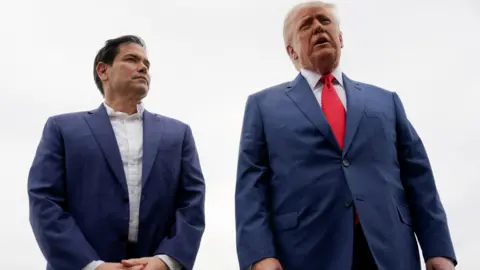The ongoing tension in the Middle East has recently encountered a dramatic escalation, marked by Israel’s military action against Iran’s nuclear facilities. In light of these events, the United States has publicly asserted that it was not involved in the airstrikes launched by Israel. The situation has stirred significant anxiety regarding regional stability, and the US administration appears to be carefully navigating its diplomatic stance amidst potential backlash from Iran.
Secretary of State Marco Rubio articulated the US position shortly after the commencement of the strikes, labeling Israel’s military action as a “unilateral” decision. He explicitly warned Iran against retaliating against US personnel or interests. “We are not involved in strikes against Iran,” Rubio declared, emphasizing the priority of safeguarding American forces stationed in the region. His statements aimed to reassure the public and international observers that the US was not a direct participant in the hostilities. Nevertheless, Iranian state media promptly reacted, accusing Washington of complicity in the strikes which, they claimed, tragically resulted in civilian casualties.
The Israeli military operation, termed Operation Rising Lion, was described as targeting Iran’s nuclear program along with various military installations. Israeli Prime Minister Benjamin Netanyahu justified the strikes by asserting that Iran’s intentions to enhance its uranium enrichment capabilities posed an existential threat to Israel. He resolved to continue the campaign until the objectives were met, reiterating the Israeli government’s sense of urgency surrounding national security.
In a strategic move, Israel reportedly informed the United States prior to executing the strikes. This communication underscores the intricate relationship between the two nations, which often finds both collaboration and tension over military interventions. Rubio’s statement noted that Israel viewed this military operation as integral to its defensive strategy, indicating a mutual acknowledgment of the perceived threat posed by Iran’s nuclear ambitions.
Concerns regarding potential Iranian retaliation were amplified by the United States’ proactive measures, including the partial evacuation of embassy personnel from Iraq and restricting the movements of US employees within Israel. These actions reflect the administration’s understanding of the precarious balance in the region, willing to implement preventive strategies to minimize risks to American lives and interests.
President Donald Trump, who had been advocating for a diplomatic resolution with Iran, previously expressed his reservations about military incursions that could jeopardize ongoing negotiations. His cautious approach illustrates the complexity of US-Iran relations, where military action could potentially derail efforts to mitigate nuclear threats. As the situation unfolded, Trump conveyed that although he recognized the tensions, he hoped for peaceful negotiations rather than escalation into conflict.
Despite Trump’s previously indicated desire to avoid imminent military action, he acknowledged that circumstances might evolve, stating it seemed “something could well happen.” His remarks reflect the fluidity of the situation in the Middle East, where military operations and diplomatic endeavors are often intertwined, and the stakes remain high.
Looking forward, the diplomatic channel remains in focus as US Middle East envoy Steve Witkoff prepares for another round of negotiations with Iranian representatives. The upcoming discussions could serve as crucial opportunities to de-escalate tensions against the backdrop of military engagements and retaliatory threats.
In summary, the ongoing Israeli strikes on Iran have introduced new layers of complexity to an already volatile geopolitical landscape. With the United States emphasizing its non-involvement while simultaneously prepping for possible fallout, it is evident that the next steps taken by both regional powers and the US will be critical in shaping the future dynamics of Middle Eastern politics. As these events unfold, the world watches closely, aware that the ramifications of these actions could echo far beyond the immediate vicinity.



